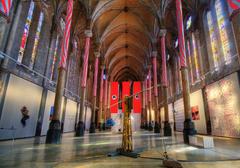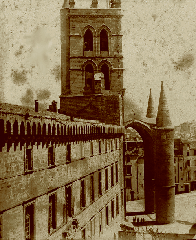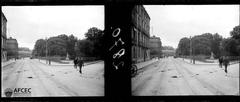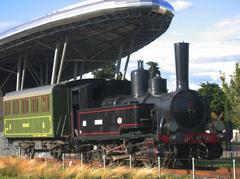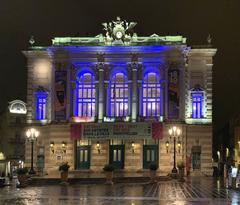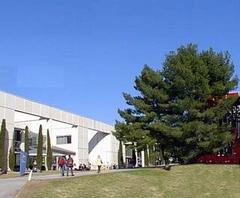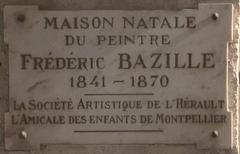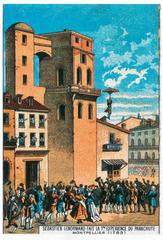Ancien Logis du Chapeau Rouge Montpellier: Visiting Hours, Tickets, and Travel Guide
Date: 03/07/2025
Introduction
The Ancien Logis du Chapeau Rouge, nestled in the heart of Montpellier’s historic Écusson district, is an architectural and cultural treasure that reflects the city’s evolution from the Middle Ages to the modern era. This guide offers a detailed overview of the monument’s history, architecture, significance, and practical information for visitors. Whether you are passionate about history, architecture, or simply eager to explore Montpellier’s storied past, the Ancien Logis du Chapeau Rouge provides a captivating experience.
Table of Contents
- Introduction
- Historical Overview
- Architectural Features
- Social and Cultural Significance
- Preservation and Heritage Status
- Visiting Information
- Visuals and Media
- Frequently Asked Questions (FAQ)
- Summary and Visitor Tips
- References
Historical Overview
Medieval Foundations and Expansion
The Ancien Logis du Chapeau Rouge stands on the site of several medieval houses, with its earliest recorded mention dating to 1447. During the late Middle Ages, Montpellier was a thriving hub for commerce and learning in the Languedoc region. The building’s transformation began in the 15th century, when it was established as an inn catering to merchants, pilgrims, and dignitaries passing through the city (POP: la plateforme ouverte du patrimoine; Wikipatrimoine).
Renaissance and 17th-Century Golden Age
By the 16th century, the Logis du Chapeau Rouge had earned a reputation as one of Montpellier’s premier inns, renowned for its comfort and extensive stables. The 17th century brought major renovations and expansion, including the absorption of neighboring properties and architectural modernization. Notable innkeepers such as Guillaume Fiquat and Jean Campan oversaw significant improvements, such as the repair of the spiral staircase and the addition of grand mullioned windows, ribbed vaults, and balustraded terraces (Monumentum).
Architectural Features
Exterior Elements
- Façades and Windows: The building features both 15th- and 17th-century architectural elements, including large mullioned windows that allow for abundant natural light. Original stone moldings and cavetto profiles provide a visual timeline of the site’s evolution (Gralon).
- Main Portal: The monumental 17th-century entrance is adorned with stone voussoirs and a pronounced keystone, reflecting its status as a reputable urban inn (POP Culture).
- Roof and Terraces: Traditional regional tiles and stone balustrades adorn the roof and terraces, enhancing the building’s silhouette.
Interior Features
- Spiral Staircase (Escalier en vis): A central stone spiral staircase, dating to the 15th century and modernized in 1638, exemplifies late medieval craftsmanship and 17th-century updates.
- Ribbed Vaults and Galleries: The ground floor and passageways display ribbed vaults and decorative arches with original moldings.
- Courtyards: Internal courtyards provide light and air, typical of Montpellier’s historic inns, and serve as focal points for circulation within the building.
Structural Materials
- Stone Masonry: Constructed mainly from local limestone, the building showcases intricate stonework and carvings, underscoring regional craftsmanship.
- Adaptations: The 17th-century expansions resulted in an irregular plan, mirroring Montpellier’s organic urban growth.
Social and Cultural Significance
The Ancien Logis du Chapeau Rouge played a crucial role in Montpellier’s hospitality tradition, serving as a hub for travelers, merchants, and local elites. Its location in the bustling Écusson district allowed it to facilitate social and economic exchange, reinforcing the city’s role as a commercial and cultural crossroads. The building’s evocative name, “Chapeau Rouge” (Red Hat), adds to its mystique, reflecting a tradition of naming urban residences after trades, guilds, or notable features (OpenAlfa).
Today, it remains an active part of the urban fabric, surrounded by cafés, artisan shops, and serving as a venue for educational and cultural programs (Tourist Places Guide).
Preservation and Heritage Status
The Ancien Logis du Chapeau Rouge is officially listed as a monument historique, benefiting from protection under French heritage laws. Preservation efforts ensure that key features—such as the spiral staircase, mullioned windows, and ribbed vaults—are safeguarded for future generations (Monumentum). The building is included among Montpellier’s 106 protected historic monuments (Wikipedia: Liste des monuments historiques de Montpellier).
Visiting Information
Visiting Hours
- Regular Access: The Ancien Logis du Chapeau Rouge is not open to the public on a regular basis. Access is generally limited to special heritage events, such as the Journées du Patrimoine.
- Event Openings: During these events, typical hours are from 10:00 AM to 6:00 PM, but it is essential to consult the official tourism website for specific dates and times.
Tickets and Guided Tours
- Tickets: Admission is typically free during heritage days. Guided tours may require advance booking through the Montpellier Tourist Office.
- Group Visits: For group or educational visits, contact local tourism offices for arrangements.
Accessibility
- Mobility Access: Due to its historic structure, accessibility is limited. Some areas—especially the spiral staircase and upper floors—may not be accessible to those with reduced mobility.
Getting There
- Address: 27 rue du Pila Saint-Gély, at the corner of rue du Chapeau-Rouge, Montpellier.
- Transport: The site is within walking distance from Montpellier’s main train station (Gare Saint-Roch) and is well-connected by public transport. Public parking is available nearby.
Nearby Attractions
- Place de la Comédie: Montpellier’s vibrant main square.
- Musée Fabre: One of France’s top art museums (Lonely Planet).
- Jardin des Plantes: France’s oldest botanical garden.
- Cathédrale Saint-Pierre: A striking Gothic cathedral.
- Marché des Arceaux: Popular food market under historic aqueduct arches.
Special Events
The Ancien Logis du Chapeau Rouge occasionally hosts cultural events, exhibitions, and guided tours as part of Montpellier’s heritage calendar. Check the official events calendar for updates.
Visuals and Media
- Exterior and Interior Photos: High-quality images of the façade, spiral staircase, and vaults enhance the visitor experience. Alt tags such as “Ancien Logis du Chapeau Rouge façade in Montpellier” and “Spiral staircase inside Ancien Logis du Chapeau Rouge” improve accessibility.
- Interactive Maps: Virtual tours and maps are available on heritage and tourism websites.
Frequently Asked Questions (FAQ)
Q: Is the Ancien Logis du Chapeau Rouge open year-round?
A: No, public access is generally limited to heritage events. Confirm dates and times with the Montpellier Tourist Office.
Q: How can I join a guided tour?
A: Book through the Montpellier Tourist Office or local heritage organizations.
Q: Is the building accessible for those with mobility challenges?
A: Accessibility is limited due to the historic nature of the structure.
Q: What other historical sites are nearby?
A: Notable sites include Place de la Comédie, Musée Fabre, Jardin des Plantes, and Cathédrale Saint-Pierre.
Q: Can I take photographs?
A: Photography is generally permitted on the exterior. Interior photography may be restricted during events.
Summary and Visitor Tips
The Ancien Logis du Chapeau Rouge is a vital link to Montpellier’s layered history, offering insights into the city’s development from the medieval era through the Renaissance and Baroque periods. Its unique blend of architectural features and cultural significance make it a rewarding stop for those interested in heritage tourism. While public access is limited, planning your visit around heritage events will provide the best opportunity to experience this remarkable monument.
Visitor Tips:
- Check official resources for current visiting hours and event schedules.
- Consider joining a guided tour for deeper insight.
- Wear comfortable shoes to navigate historic streets and uneven surfaces.
- Explore nearby attractions to make the most of your trip to Montpellier’s historic center.
For a richer experience, download the Audiala app for audio guides and real-time updates, and follow Montpellier’s cultural channels for event news and heritage highlights.
References
- POP: la plateforme ouverte du patrimoine
- Wikipatrimoine
- Monumentum
- Montpellier Tourism
- Wikipedia: Liste des monuments historiques de Montpellier
- Gralon
- OpenAlfa
- Tourist Places Guide
- The Crazy Tourist
- Le French Guide
- Lonely Planet
